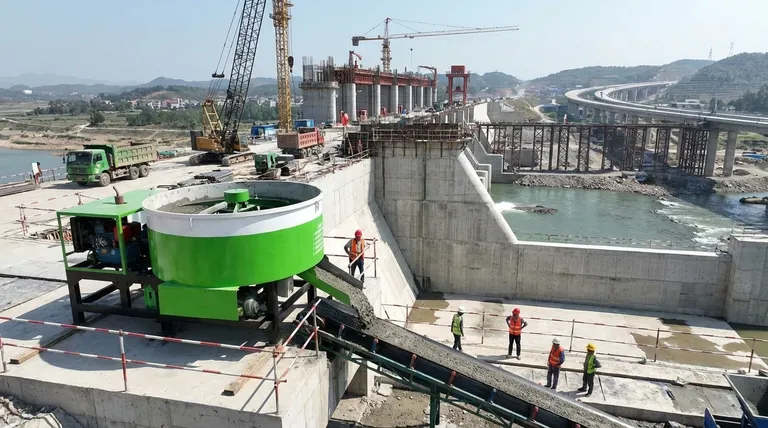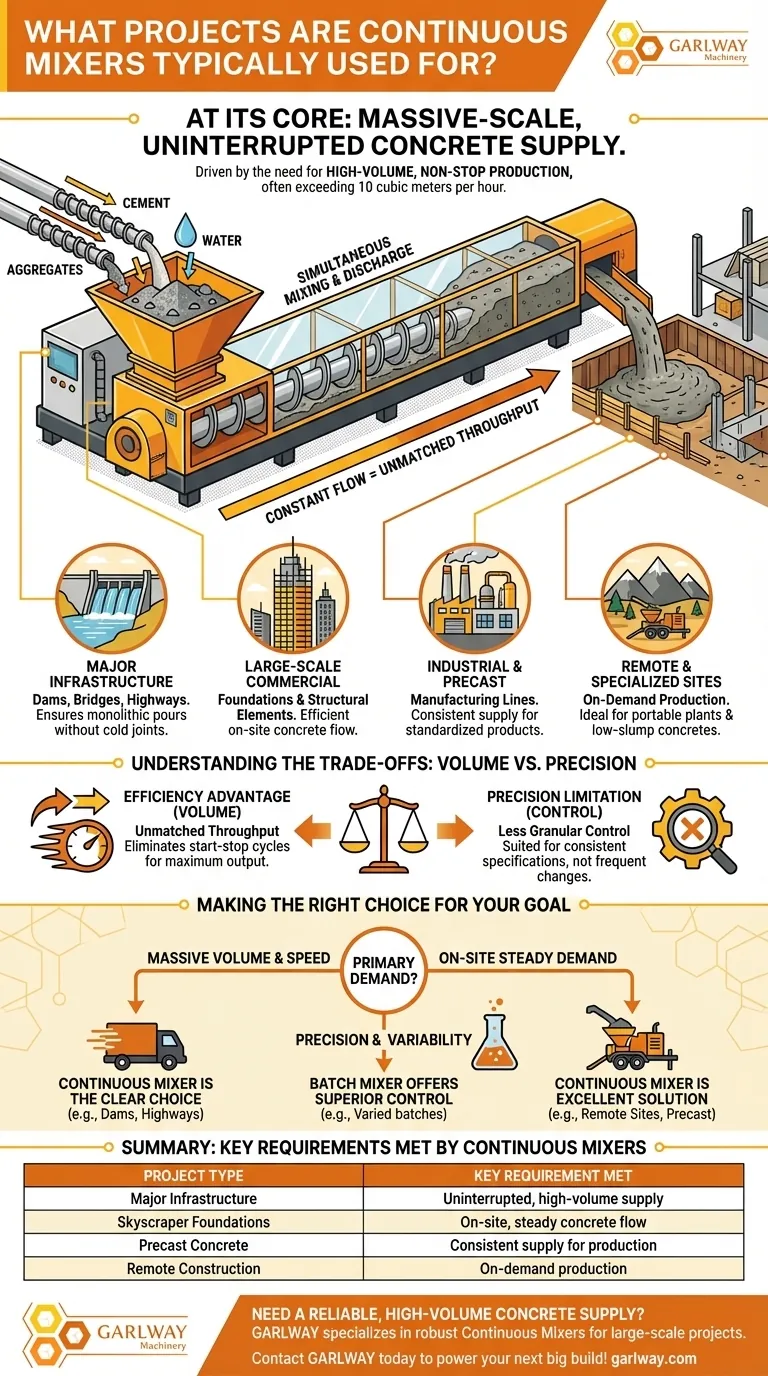At its core, a continuous mixer is used for massive-scale projects where an enormous, uninterrupted supply of concrete is the primary requirement. They are the workhorses behind major infrastructure like dams, bridges, and highways, as well as large industrial projects and the foundations of skyscrapers. The defining characteristic is their ability to produce a steady flow of concrete, often exceeding 10 cubic meters per hour.
The decision to use a continuous mixer over a traditional batch mixer is driven by one factor above all else: the need for high-volume, non-stop production. It sacrifices the ability to create small, precisely varied batches for the immense efficiency of a constant flow.

How Continuous Mixers Drive Efficiency
The operational design of a continuous mixer is fundamentally different from a batch mixer, and this design dictates its ideal use cases. It functions less like a kitchen blender and more like an assembly line.
The Principle of Constant Flow
A continuous mixer is fed a constant stream of raw materials—aggregates, cement, and water—typically via screw feeders or hoppers. These materials enter the mixing chamber, which is often a long trough containing an auger or mixing screw.
Simultaneous Mixing and Discharge
As the materials move along the chamber, they are continuously mixed. By the time they reach the end, the concrete is fully combined and is discharged from a chute at the same rate new materials are being loaded. This creates a seamless, uninterrupted supply of fresh concrete.
The Ideal Projects for Continuous Mixing
The relentless output of a continuous mixer makes it the perfect tool for specific types of large-scale construction where stopping a pour is not a viable option.
Major Infrastructure Projects
Projects like dams, large bridges, and highway paving require vast, monolithic concrete structures. A continuous mixer provides the steady, high-volume stream necessary to complete these massive pours without "cold joints" or inconsistencies that could compromise structural integrity.
Large-Scale Commercial Construction
The construction of skyscrapers and high-rise buildings often involves pouring enormous foundations and core structural elements. A continuous mixer on-site can ensure this critical phase proceeds efficiently without delays caused by waiting for separate batches of ready-mix concrete.
Industrial and Manufacturing Applications
Precast concrete manufacturing facilities often use continuous mixers to feed their production lines, ensuring a consistent supply for creating standardized products like pipes, panels, and blocks. Similarly, large industrial plants may require a dedicated, on-site source for prolonged construction phases.
Remote or Specialized Sites
For remote construction sites, transporting ready-mix concrete can be logistically challenging and expensive. A continuous mixer acts as a portable concrete plant, providing fresh material on demand. They are also well-suited for producing low-slump concretes, such as those used in slipform paving for roads.
Understanding the Trade-offs: Volume vs. Precision
While powerful, a continuous mixer is not the right tool for every job. The choice between a continuous and batch mixer comes down to a clear trade-off.
The Advantage: Unmatched Throughput
The primary benefit is sheer volume and speed. By eliminating the start-stop cycle of loading, mixing, and discharging individual batches, a continuous mixer achieves a level of output that is simply impossible for a batch mixer of a similar size.
The Limitation: Less Precise Control
The key trade-off is a reduction in granular control. While modern continuous mixers are highly accurate, they are designed to produce one consistent mix specification for a long duration. They are not suited for projects that require frequent changes or small, distinct batches with varying properties.
The Consideration: Setup and Scale
Continuous mixers are large, complex machines. Their setup is a significant undertaking, making them impractical and cost-prohibitive for small deliveries or short working times. They are built for the marathon, not the sprint.
Making the Right Choice for Your Goal
Selecting the right mixer is about aligning the equipment's core strength with the primary demand of your project.
- If your primary focus is massive volume and speed: A continuous mixer is the clear choice for projects like dams or highways where an uninterrupted supply is the most critical factor.
- If your primary focus is precision and variability: A batch mixer offers the superior control needed for projects requiring many different, precisely measured concrete specifications.
- If your primary focus is on-site production for a steady demand: A continuous mixer is an excellent solution for remote sites or precast factories, acting as a dedicated, high-efficiency production plant.
Ultimately, choosing the right mixing technology begins with a clear understanding of your project's scale, pace, and material requirements.
Summary Table:
| Project Type | Key Requirement Met by Continuous Mixer |
|---|---|
| Major Infrastructure (Dams, Bridges) | Uninterrupted, high-volume supply for monolithic pours |
| Skyscraper Foundations | On-site, steady concrete flow for large structural elements |
| Precast Concrete Manufacturing | Consistent supply for production lines |
| Remote Construction Sites | On-demand production, reducing transport logistics |
Need a Reliable, High-Volume Concrete Supply for Your Major Project?
GARLWAY specializes in construction machinery, offering robust and efficient continuous mixers for construction companies and contractors tackling large-scale infrastructure, commercial high-rises, and precast manufacturing. Ensure your project's success with a steady, on-site concrete supply that eliminates delays.
Contact GARLWAY today to discuss how our continuous mixers can power your next big build!
Visual Guide

Related Products
- Ready Mixer Machine for Construction Ready Mix Machinery
- Portable Ready Mix Concrete Mixer Equipment
- Auto Concrete Cement Mixer Machine New
- Construction Products Concrete Plant Machine Mixing Concrete Mixer
- HZS90 Large Multiquip Concrete Mixers for Construction
People Also Ask
- What should be considered regarding the output of a concrete mixer? Match Capacity to Your Project Scale
- Why is cleaning a concrete mixer after use important? Avoid Costly Repairs and Ensure Quality
- Can a concrete mixer be used for mortar? Understanding the trade-offs for your project
- What is the average lifespan of a concrete mixer? Maximize Your Equipment's Lifespan & ROI
- What is the function of a concrete mixer machine? Achieve Consistent, High-Quality Concrete for Your Projects



















